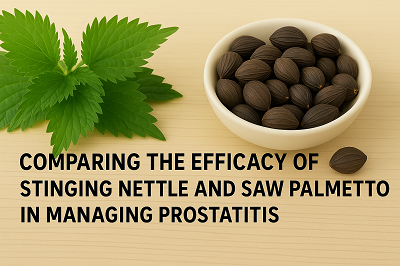Comparing the Efficacy of Stinging Nettle and Saw Palmetto in Managing Prostatitis
Prostatitis is a common urinary system disease that troubles men worldwide. Many middle-aged men have likely experienced symptoms such as frequent urination, urgency, perineal discomfort, and even impacts on their marital life. When visiting a doctor, they may be prescribed antibiotics, but the effects often feel unsatisfactory, and there are concerns about side effects.

Long-term antibiotic use may also lead to issues like intestinal flora imbalance and liver burden. In such cases, natural herbal remedies become a worthwhile alternative. In recent years, plant-based therapies like stinging nettle and saw palmetto have gained widespread attention for their safety and efficacy. So, which of these two herbs is more suitable for prostatitis patients? Let's delve deeper into the details!
Stinging Nettle: Europe's "Anti-Inflammatory Powerhouse"
First, let's meet our first protagonist—the stinging nettle. Despite its prickly name, when appropriately extracted, it becomes a "good friend" to the prostate. In Europe, stinging nettle dates back to the Middle Ages. People discovered back then that the root extract of this plant was particularly "friendly" to the urinary system. Modern research confirms that stinging nettle contains multiple active compounds, functioning like a natural anti-inflammatory agent that gently relieves prostate swelling and discomfort.
What's especially noteworthy is the unique ability of stinging nettle to help balance male hormones. Many prostate issues are related to hormonal imbalances, and stinging nettle acts like a "regulator," reducing excessive dihydrotestosterone (DHT) levels and thereby alleviating prostate pressure.
When consuming it, you can boil the nettle and blend it into juice or make it into a soup. However, extra caution is required during preparation because the fine stinging hairs on its surface can cause allergic reactions, leading to hand swelling and numbness. These allergic symptoms may persist for several days. Before consumption, blanch the nettle first, then mix it with minced garlic, sesame oil, and oyster sauce for a refreshing and unique flavour.
After consumption, you may notice reduced urinary frequency, fewer nighttime bathroom trips, and a significant alleviation of that bothersome bloating sensation. Moreover, due to its diuretic properties, it helps "flush" the urethra, which is beneficial for preventing urinary tract infections.
Saw Palmetto: The Native American "Prostate Guardian"
Saw palmetto is a plant native to North America and has been used by Native Americans to support male urinary health since ancient times. The extract from saw palmetto berries acts as a 5-alpha-reductase inhibitor, primarily treating benign prostatic hyperplasia (BPH) by preventing or slowing prostate enlargement. This substance inhibits inflammation mediated by white blood cells, reducing symptoms like redness, swelling, and exudation in prostate tissue, thereby alleviating prostatitis-related discomfort. Saw palmetto may also help improve blood circulation in the prostate, relieving congestion-related discomfort caused by chronic prostatitis.
With continued use, the enlarged prostate may gradually shrink or stop growing. Many middle-aged and older adults who take saw palmetto long-term find that not only does urination become smoother, but sexual function also improves. However, it's important to note that saw palmetto is a "slow worker"—it usually takes 8–12 weeks to show noticeable effects. Its advantage lies in its long-lasting benefits, making it suitable for prolonged management.
Which One Should You Choose?
Now, you might wonder: Should I choose stinging nettle or saw palmetto? Let's compare them.
Stinging nettle may be a better fit for you if:
- Your symptoms flare up suddenly with a distinct burning sensation.
- There are signs of a urinary tract infection.
- You are relatively young, and inflammation is the main issue.
- You want faster symptom relief.
Saw palmetto may be more suitable if:
- You are a middle-aged or older man.
- Your main issue is difficulty urinating.
- You have significant prostate enlargement.
- You are willing to be patient with long-term management.
Of course, these two options are not mutually exclusive. Under professional guidance, they can work synergistically. For example, using stinging nettle during the day for quick symptom relief and saw palmetto at night for long-term regulation can yield unexpectedly good results.
Additional Lifestyle and Dietary Support
When using natural remedies, remember to pair them with a proper diet, daily care, and preventive measures.
Dietary Adjustments:
- Avoid alcohol and spicy foods.
- Reduce fried and grilled foods.
- Opt for a light, easily digestible diet.
Daily Care:
- Engage in moderate physical exercise.
- Avoid long bike rides or prolonged sitting; take breaks to move around.
- Keep warm and avoid cold stimulation.
Preventive Measures:
- Maintain personal hygiene and change underwear frequently.
- Drink plenty of water and avoid holding urine for extended periods.
Natural Remedies, Enhanced with Tradition
In addition to stinging nettle and saw palmetto, many patients have found relief through traditional Chinese medicine, particularly the Diuretic and Anti-inflammatory Pill.
This herbal formula combines anti-inflammatory, blood-circulating, and antibacterial effects. Unlike single-herb treatments, it tackles prostatitis from multiple angles: reducing swelling, clearing heat and dampness, and improving urinary flow.
Especially for those who experience frequent relapses or have not responded well to Western antibiotics, this gentle yet powerful remedy offers a well-rounded, side-effect-free solution backed by years of clinical use.
To learn more about this natural formula and how it compares to your current approach, visit: https://www.diureticspill.com/



